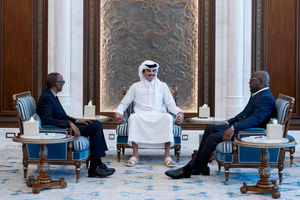Prime
Tanzanian muslims in US mark Eid amidst nostalgia for home

Nabila Ghassany PHOTO | courtesy
What you need to know:
- While Eid abroad differs from celebrations at home, the Tanzanian community ensures the festive spirit endures. Eid Mubarak to all celebrating
As Tanzania’s Ambassador to the United States, Elsie Kanza attended President Trump’s Iftar gala while the Tanzanian community in the US prepared for the Eid festival.
The conclusion of 30 days of Ramadan fasting brings a time of family gatherings and celebration.
However, for many Tanzanians living abroad, including Nabila Ghassany, Eid takes on a different significance far from home. Residing in Georgia, Nabila is one of many Tanzanian Muslims celebrating Eid away from their homeland. Each Ramadan in the US feels different for her as she adapts to a new way of life.
Fasting hours fluctuate depending on the season, sometimes shorter than in Tanzania, but the essence of Ramadan remains unchanged: prayers, fasting, and self-reflection.
Being away from family during Eid is particularly challenging. The laughter, home-cooked meals, and warm communal spirit of Tanzania are irreplaceable.
Yet, technology offers solace—video calls with loved ones help bridge the distance.
Additionally, Tanzanians in the US have formed close-knit communities that act as a support system.
One such community is the Tanzania Islamic Society of North America (TISONA), founded in 2020.
This organization unites Muslims in North America and East Africa, engaging in education, Da’wah, community outreach, and charitable efforts, including supporting orphans and economic empowerment projects.
Eid is synonymous with feasting and generosity, and Nabila is preparing an elaborate spread that includes cakes, meatloaf, mandazi, cutlets, chapati, samosas, and the beloved biryani.
Although she tries to replicate Tanzanian flavors, she admits: “There’s something about the spices, the fresh ingredients, and the cooking methods back home that make Tanzanian food special.”
If she were in Tanzania, her Eid celebration would involve a grand family gathering. In Atlanta, however, she will celebrate with fellow Tanzanians, attend mosque prayers, and cherish the day with friends. For her, Ramadan is a spiritual test, and she encourages fellow Muslims to continue the habits cultivated during the holy month—praying regularly, giving charity, and maintaining faith. Beyond faith, cultural traditions remain a key part of Eid.
For women, an abaya is as significant as the feast itself. In Tanzania, the demand for abayas soars during Eid, and Nabila ensures she purchases one whenever she visits home. A good abaya, costing between $100 and $150, is a prized possession. Music is another way she stays connected to her roots; Tanzanian artists like Harmonize, Zuchu, Marlaw, and Aslay uplift her spirits. “Their music makes me feel at home; the beats are simply unmatched,” she says.
Nabila and her husband have made Atlanta their home, and their son recently graduated from high school. She moved to the US seeking new opportunities, drawn by the city’s diverse community. Despite the initial culture shock—especially regarding individualism and tipping customs—she has adapted while preserving her Tanzanian heritage. She speaks Kiswahili frequently and fills her home with the aromas of Tanzanian cuisine.
She emphasises that Eid is not about extravagance but about gratitude and togetherness.
“Young people should not stress over finances during the holidays. Eid is about faith, family, and appreciation,” she advises. With Tanzania’s general elections approaching, she encourages young Tanzanians to vote wisely, saying, “Your vote is your voice. Think about Tanzania’s future and vote with integrity.”
For Tanzanians in the diaspora, Eid highlights the importance of community.
Those moving to the US are encouraged to connect with fellow Tanzanians, as these networks provide vital support in adjusting to a new environment.
While Eid abroad may lack the vibrancy of home, the Tanzanian community ensures that the festive spirit endures. Eid Mubarak to all celebrating.




